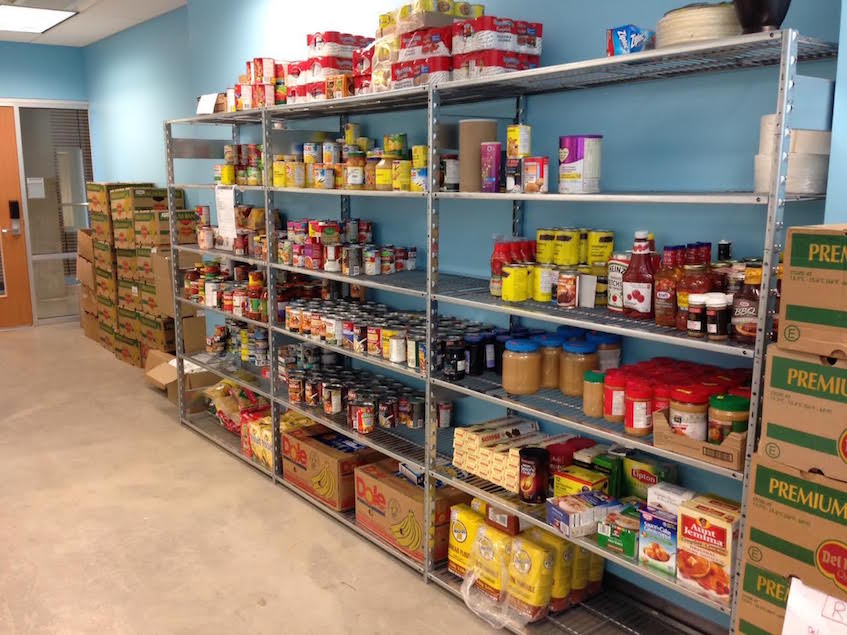By Valerie Franklin (The Cascade) – Email
Print Edition: July 15, 2015

What’s more important — paying tuition, or being able to afford food?
“Sometimes it is a choice,” says SUS vice president external Sukhi Brar. “It’s hard for a lot of people to comprehend that.”
Brar has been spearheading the reopening of UFV’s food bank in its new space on the second level of the SUB in room S2115 — and although the food bank won’t officially reopen until September, it’s already offering assistance to UFV students in need.
“We’ve been trying to accommodate requests as they come,” says Brar. Despite how quiet the campus is during the summer, Brar has already been receiving emails from people requesting assistance from the food bank, and estimates that it currently serves about five to 10 students per week.
The reopening of the food bank will also offer relief for students who are living in residence and don’t have their own transportation; Brar notes that because of UFV’s distance from the city centre, these students are unable to access local resources like the Abbotsford Food Bank (AFB) or even local grocery stores.
“I don’t think people in general on our campus realize how many students are facing food sustainability issues,” she says. “It’s something you keep confidential.”
From points to hampers
At the beginning of June, UFV’s food bank became an official satellite of the AFB, which now supplies it with food and other necessities.
The AFB has also been helping Brar to remodel the UFV food bank’s system, which previously operated on a points system that allowed students to choose what they wanted based on how many points each item was worth; however, this created situations where their stock was quickly depleted due to people sometimes taking the food bank’s entire supply of certain items, making it difficult to keep up with demand.
“We’d have our shelves really full and then not so full, and not super reliable with what we had,” Brar says.
Instead, UFV’s food bank will now rely on a hamper system which provides applicants with a pre-packed box of food and supplies. Depending on the number of people in the applicant’s family, different sizes of hampers are available, and can include other necessities such as baby formula if requested.
SUS’s website will soon be updated with a request form that allows students to apply for one of these hampers online, and students will be required to input their student number into the form rather than presenting ID, as was previously required. Brar also plans to implement a discreet pick-up system that will allow students to collect their hampers at the SUS front desk rather than at the food bank itself.
New space, new opportunities
When UFV’s food bank originally opened in October 2013, it was unable to stock perishables because it lacked the room for cold storage in its relatively small C building space. The new and much larger space in the SUB has been equipped with two freezers and a fridge, which Brar hopes will soon offer perishable foods like milk and eggs to students in need.
“It creates more options for us, because we have more space and because we have cold storage,” she says. “We can look into storing that kind of thing once we sort out our process with nonperishable foods.c
As for the rest of the space in their new room, Brar says they’re currently consulting with students who use the food bank to see what they would benefit from most in that space.
Food and volunteers needed
Keeping shelves stocked and applicants fed is a constant struggle that most food banks, including the AFB, face because of their reliance on donations — and because the UFV food bank relies on the AFB for supplies in turn, it may also be vulnerable to any supply shortages the AFB experiences. Brar was among a group of students who visited the AFB’s warehouse while its stock was at a 20-year low.
“It was really scary because they just had nothing; they had very little on their shelves,” she says. As a result of having seen such a shortage firsthand, Brar is conscious of the need to plan ahead in case that situation recurs.
“If they got into trouble with their supply, that would affect us directly,” says Brar. “So being sustainable is the main success point for this year, at least in terms of what’s doable in a year.”
Hoping to bolster the UFV food bank’s community connections in the case of a future contingency, Brar is reaching out to nearby grocery stores to see if they’re open to a sponsorship or partnership, and is also looking into whether various upcoming local events will accept food bank donations instead of charging for admission or parking. During SUS’s June board meeting, $8,000 was also transferred from the student conference budget to the student emergency fund and the food bank, which may help to cover costs.
“I really want to see us as a point where we have a system that’s really sustainable, where we have a constant level of food in our food bank, so whenever a student does walk in, they have access to what they need,” Brar says.
The SUS food bank will be accepting donations on an ongoing basis.
Students in need of assistance from the food bank or who would like to volunteer are encouraged to contact foodbank@ufvsus.ca.

